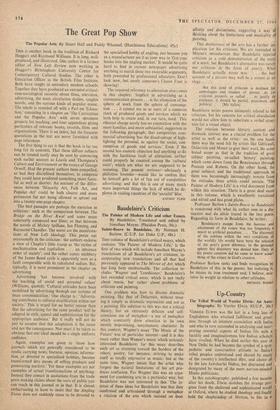Baudelaire's Criticism
The Painter of Modern Life and other Essays. By Baudelaire. Translated and edited by Jonathan Mayne. (Phaidon Press, 34s.) Sainte-Beuve to Baudelaire. By Norman H. Barlow. (C.U.P. for Duke U.P., 48s.)
THIS volume of Baudelaire's critical essays, which contains The Painter of Modern Life,' is the first of two which will include Jonathan Mayne's translations of all Baudelaire's art criticism, in- corporating new translations and all that had previously appeared in The Mirror of Art, which has long been unobtainable. The collection in- cludes 'Wagner and Tannhiiuser,' Baudelaire's last extended critical essay, which is not really about music, but rather about problems of criticism and painting.
One problem was how to discuss dramatic painting, like that of Delacroix, without treat- ing it simply as dramatic expression and not as a painting. His solution to this was not a critical theory, but an extremely delicate and self- conscious use of metaphor—a use of metaphor which constantly drew attention to its own merely improvising, unsystematic character. In this context, Wagner's essay 'The Music of the Future' was of particular interest—and it is this essay rather than Wagner's music which seriously interested Baudelaire; for this essay describes each art as straining toward the borders of the others, poetry, for instance, striving to make itself as totally expressive as music; but at the same time, Wagner insists that the artist who forgets the natural limitations of his art pro- duces confusion. For Wagner this was an argu- ment for combining arts in a particular way, but Baudelaire was not interested in this. The in- terest of these ideas for Baudelaire was that they confirmed and articulated through a metaphor a relation of the allts which insisted on their
affinity and distinctness, suggesting a way of thinking about the literariness and musicality of painting.
This distinctness of the arts has a further im- plication for his criticism. We are reminded in Mayne's introduction that Baudelaire rejected criticism as a cold demonstration of the unity of a work, but Baudelaire's alternative was surely not criticism in the form of poetry. What
• Baudelaire actually wrote was: `. . . the best account of a picture may well be a sonnet or an elegy . .
But this kind of criticism is destined for anthologies and readers of poetry. As for criticism properly so called . . . to justify its existence, it should be partial, passionate, and political. . . . [My italics]
Baudelaire wrote poems intimately related to his criticism, but his concern for critical elucidation would not allow him to substitute a verbal struc- ture for a visual object.
The relation between literary content and dramatic interest was a crucial problem for the artist as well as the critic: on the one hand, there was the need felt by artists like Gericault, Delacroix and Manet to give their work the same broad scope as that in the tradition of great subject painting, so-called 'history' painting, which came down from the Renaissance through Poussin and Rubens. On the other hand, the great subjects and the traditional approach to them was becomingly increasingly remote from the attitudes these artists could sustain. 'The Painter of Modern Life' is a vital document from within this situation. There is a great deal more in this volume, which is excellently translated and edited and has good plates.
Professor Barlow's Sainte-Beuve to Baudelaire is concerned with what its author sees as a dis- tinctive mat du sit cle traced in the two poets.
Regarding its form in Baudelaire, he writes:
Baudelaire's escape from the horreur and attainment of the extase was too frequently a resort to artificial paradises. . . . The discovery of the sublime within the very conditions of -the worldly life would have been the solution of the poet's grave dilemma. In the personal sphere this discovery was denied him. Only in his poetic creation did he come to know sonic- thing of the extasy in God's creation.
Professor Barlow seeks and finds recognition by Baudelaire of this in the poems, but isolating it, he misses its iron treatment and, I believe, mis- takes its weight in relation to other attitudes.
MICHAEL PODRO




























 Previous page
Previous page